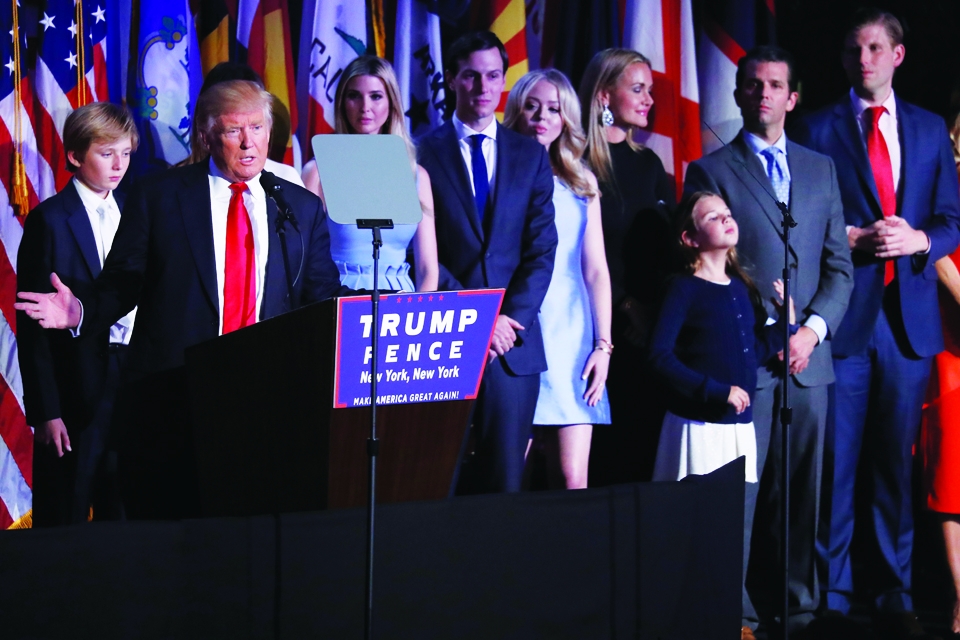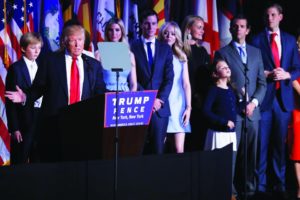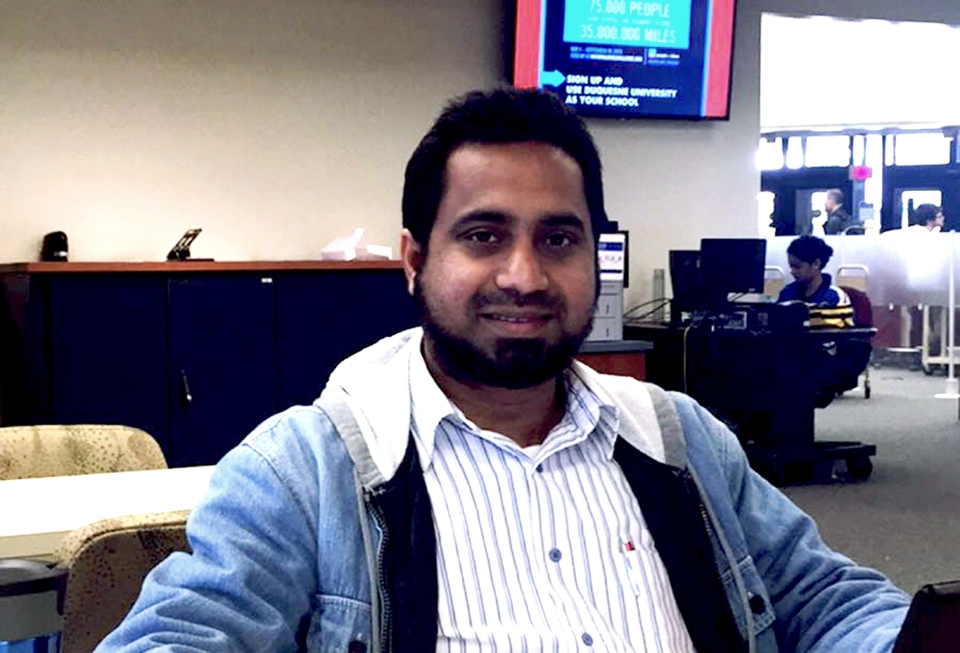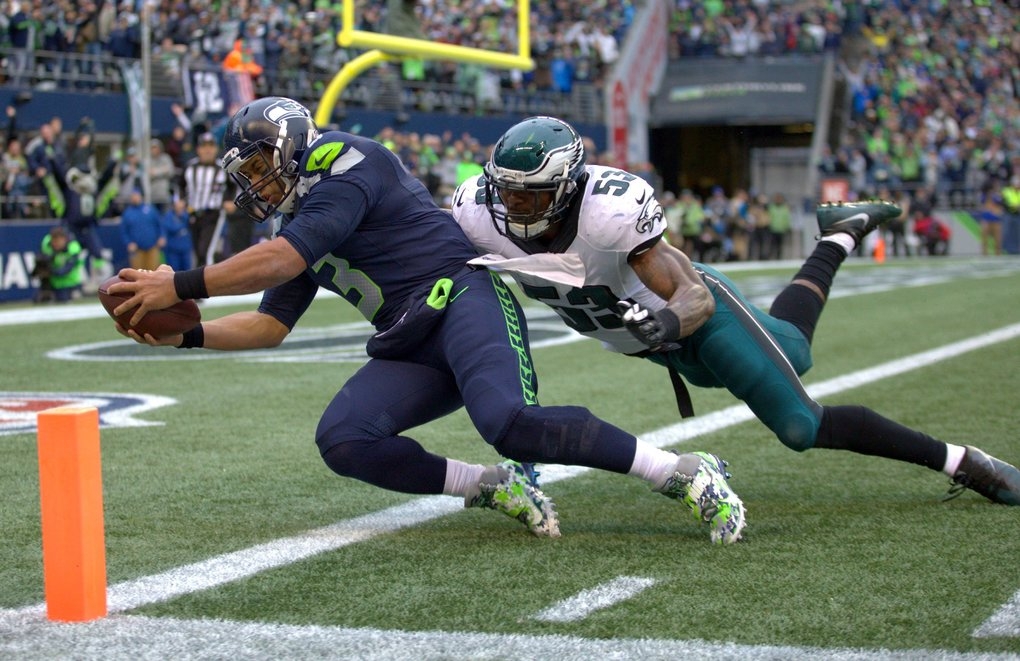

President-elect Donald Trump, is joined by his family as he gives his acceptance speech during his election night rally, Wednesday, Nov. 9, 2016, in New York. (AP Photo/Mary Altaffer)
By Ollie Gratzinger | Staff Columnist
For the past year or so, everyone in the country — and some beyond — had their eyes set ahead to Tuesday, Nov. 8: the day America would decide who replaces Barack Obama as the President of the United States after eight years in office.
That day has come and gone.
Many first time voters — myself included — headed out to the polls bright and early in hopes of beating the lines and voicing our opinions in what was arguably one of the most volatile, consequential elections in United States history. We saw the commercials, and we heard the tapes of that which was said behind closed doors. With that knowledge, we became fiercely divided along moral, social and economic lines.
As we boasted our “I voted” stickers and complemented each other on performing our civic duties, we also paused to ask ourselves, “How did we get here? What comes next?”
For me, the trip started shortly after sunrise with a Port Authority bus bound for the North Side, where a tiny community firehouse had been designated as my polling location. I’d been there before with my father, but this time was different. I’ve been notorious for complaining about the politics of the nation in essays and PowerPoint presentations, but this marked the first time that I could actually do something about it.
The first thing I noticed was that there weren’t too many people around the polling station. I’d expected lines, wait-times and people with signs embodying the spirit of the heated election, but instead I rounded the back of the building and found myself facing a water-damaged, yellowed sign that said, “Vote Here.”
The rest was straightforward. I was warned that the ballot wasn’t just for electing a new presidential candidate, but also a new senator, Attorney General and more. I’d done my research, but had I not, there was a button on the side of the ballot that allowed a voter to select their party affiliation, and upon doing so, all of the candidates for that party would be selected. Some might argue that there’s a certain level of toxicity within the idea of voting for someone because they belong to a specific party.
Regardless, I voted. I got my sticker — which clearly was the most important part — and joined my mother outside, where we discussed what it meant for me to have just voted for the first female candidate in American history, what it meant to choose the lesser of two evils and what it would mean come later when the polls around the nation closed.
The day that followed was filled with the buzz of nervous energy. Time passed in a haze of excited whispers and guessing games about what nightfall would bring. There was an underlying tension to the air, though, an uncertainty as we learned things about the views of our friends and relatives that we would’ve rather left unearthed. I experienced a unique kind of ugliness — a division among those who were united yesterday, marked by soured looks, minced words and things left unsaid. That, I suppose, is the darkest side of politics.
We gathered around to watch the election play out, fueled by coffee and the excitement to be part of something historic. The numbers came rolling in, and red crept across the country from sea to shining sea. Winning Florida and Pennsylvania, both vital swing states, gave Trump the edge that he needed to power ahead in the race. Fate was sealed, then, no matter how reluctant we were to believe that the impossible had happened.
What started off as some comical aside in the grand scheme of U.S. politics had become a reality: Donald Trump is our next president.
I respect an educated opinion. The problem exists not within the fact that I disagree with the way things turned out — though I do, and strongly — but rather that the election has exemplified ignorance and strengthened a pre-existing divide among people.
While many voted either way because their morals aligned with their candidate of choice, there are others who voted out of malice and bigotry. Beyond that, there are those who made light of the whole thing. It’s estimated that a sizable proportion wrote in “Harambe,” the gorilla killed at the Cincinnati zoo about six months ago, as a presidential candidate.
This is all very real. If there’s one thing that I’ve learned from my experiences as a first-time voter, it’s that every vote really does count. There was a time during the tallying of ballots that Trump was leading in New Hampshire by 15 votes. Of course, the number grew into the hundreds, but in hindsight, there were more people than that who steered clear of the polls out of principle or protest. Had all those people voted, and had those who voted third party chosen differently, we may not be facing down the impending insecurity of a Trump presidency.
There’s no telling what the next four years will bring, but this election has surely altered the way we look at our political system. We must step back and assess our situation, taking the time to think critically about what these election results will mean not only to us, but to our neighbors, peers and friends as well.




